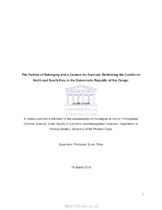| dc.description.abstract | I set out to rethink the ongoing conflict in North Kivu and South Kivu in the Democratic Republic of the Congo (DRC). I highlight two problems with regards to the current conceptualisation of the conflict in North Kivu and South Kivu. The first is a theoretical problem and here I demonstrate that the Banyarwanda and Banyamulenge’s quest for belonging has so far been restricted to citizenship. Congolese Banyarwanda and the Banyamulenge find themselves in a peculiar situation, at various times in the postcolonial Congolese state they had recognition from above but lacked recognition from below. It is in this context that a politics of belonging developed. The second problem is with regards to the history of the conflict. I argue that most scholarly works take the 1993 conflict in North Kivu as the starting point of the conflict, but the conflict can be traced back to an earlier date. It was with this in mind that I pose the following question: Can the conflict in North and South Kivu in the DRC be considered as a politics of belonging between indigenous Congolese and Kinyarwanda speaking Congolese, and a contest for survival between Hutu and Tutsi elites?
My research is qualitative and since the problem is theoretical and historical I had to think about how the conflict was presented in terms of definitions, meaning, concepts, and so on. Therefore, this research is guided by critical theory and uses a case study research design. For this purpose, I relied on both primary and secondary data. Primary data sources for this study include the following: photographs that was taken while I was deployed in the DRC as a soldier, my personal deployment diary, internet newspaper articles, research reports of the United Nations, Amnesty International and Human Rights Watch, a focus group with expats from North Kivu and South Kivu, a questionnaire I distributed among expats from the DRC and an online discussion forum. | en_US |

